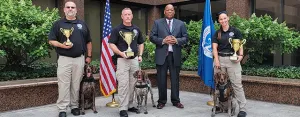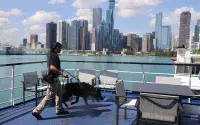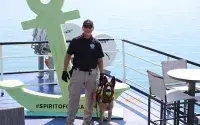
For canine teams across the nation, the Windy City Canine Challenge (WCCC) is a well-respected competition that only a select few compete in. The weeklong challenge tests the knowledge, bond and communication between handlers and their canine partners.
Sean Shiplett, a Canine Training Instructor based out of Chicago, is the event’s founder and organizer. He created the WCCC in 2020, starting with a pilot event and then growing it to include more challenging scenarios and additional competitors outside the Chicago area. This year, Shiplett collaborated with several TSA field offices and external organizations to successfully execute the largest WCCC to date.
“The end state goal was to allow for the participating teams to attain the highest level of training and readiness for follow-on operational employment after the competition,” said Shiplett, who believes the event creates a strong collaborative learning atmosphere and networking opportunity. “It also facilitated the opportunity for handlers and trainers to come together for a morale building and reinforce personal pride, unit identity and esprit de corps.”
Steven C. Brown, deputy assistant federal security director for Threat Assessment Programs, commented, “The canine competition was a great opportunity for canine teams to showcase their technical skills and ability in explosives detection in all modes of transportation. The training scenarios were top-notched and challenged all of the teams whether in the airport, rail or marine. The technical and professional knowledge, skills and abilities help make the canine program a successful one.”
This year, eight canine teams earned a spot in the competition, representing Chicago Midway (MDW), Chicago O’Hare (ORD), Dallas Fort Worth (DFW), Detroit Metro Airport (DTW), Jacksonville International, Milwaukee’s Mitchell International, Orlando International (MCO) and St. Louis Lambert International (STL) Airports.
Leading up to the competition, handlers and their canine partners prepped for events that would test them mentally and physically. Brian Daufenbach and his partner Dora from MDW prepared by focusing on three training elements – stamina, canine independence and training in unfamiliar places. Their disciplined efforts paid off, and the duo took home first place in the competition.
For second-place winner, JoAnne Vasek and her partner Mika, this meant competing against seven other MCO canine teams to secure a place in the WCCC.
The WCCC is designed to challenge and evaluate both the handler and canine. Without each partner contributing and cooperating, the team would fail.
“One partner cannot succeed without the other, and assessing the team as a total entity is imperative,” explained Shiplett.
The first event quizzed the handlers’ book smarts in a 35 question written assessment, focusing on general knowledge of the National Explosives Detection Canine Team Program and TSA publications, manuals and directives. Next, teams were evaluated in a timed canine first-aid skills assessment that judged their ability to act under pressure.
The competition’s last event was a participant favorite and structured off TSA’s year-round support of National Special Security Events (NSSEs). Teams raced to respond and secure Chicago-area venues, including the Navy Pier; Chicago Union Station; MDW and ORD, in scenarios reflective of typical NSSEs deployments.
“My favorite event was Navy Pier,” Daufenbach recalled. “There were four different searches to include a ship combined with vet training in-between runs. We have never searched a ship before, so gaining that experience was amazing.”
Similarly, Vasek enjoyed the trickiness of exploring unfamiliar territory. “The entire day at Navy Pier was our most challenging event,” she said. “There were a lot of variables and elements in play that entire day that had all of us handlers frustrated. However, I know that each of us learned a ton that day, which is the goal – to always be learning, adjusting and adapting.”
Reflecting on the successful event, Shiplett said, “I really relished in the opportunity to witness handlers, when presented with an unknown situation or scenario, being able to navigate and persevere through the adversity. Being able to afford this opportunity to the teams is really what it is all about – the betterment of the individual team and the canine program as a whole.”
As Daufenbach smiled for the champion photo, he felt pride standing next to his friend Vasek. The two came full circle.
“She was my mentor when I first came into the canine program, so that was something special to me,” said Daufenbach, “I appreciate all the time and effort she put in to helping me along the way. She really deserves a lot of credit for what she has done for me as well as many other new handlers.”
“The outcome of this year’s Windy City Canine Challenge validates Brian’s hard work and dedication with his partner Dora to being the best,” Shiplett said.
By Kimberlyn Pepe, TSA Strategic Communications & Public Affairs



